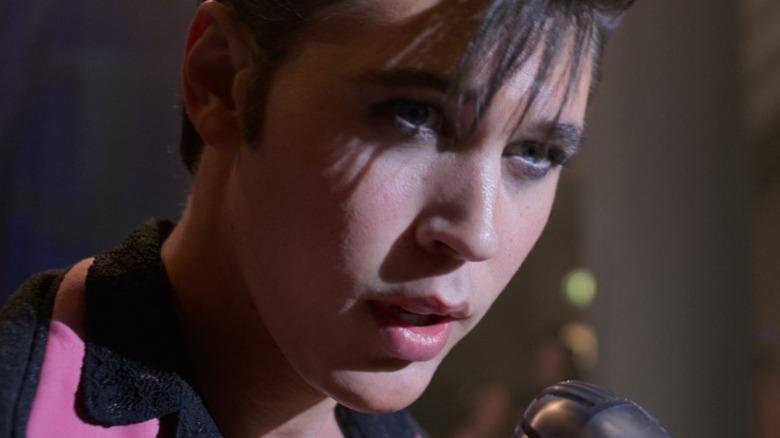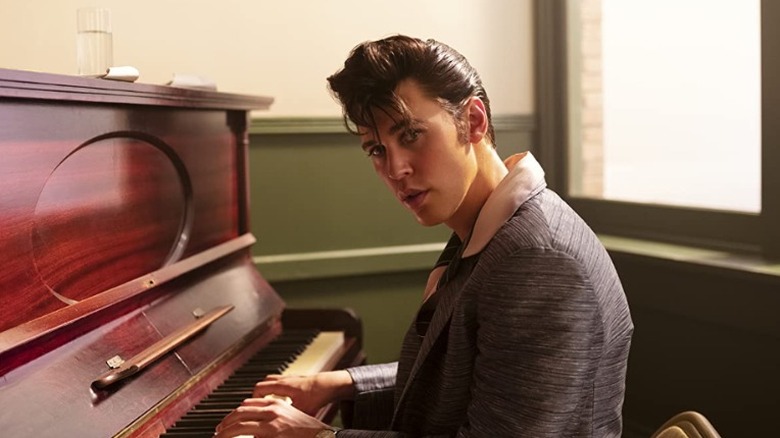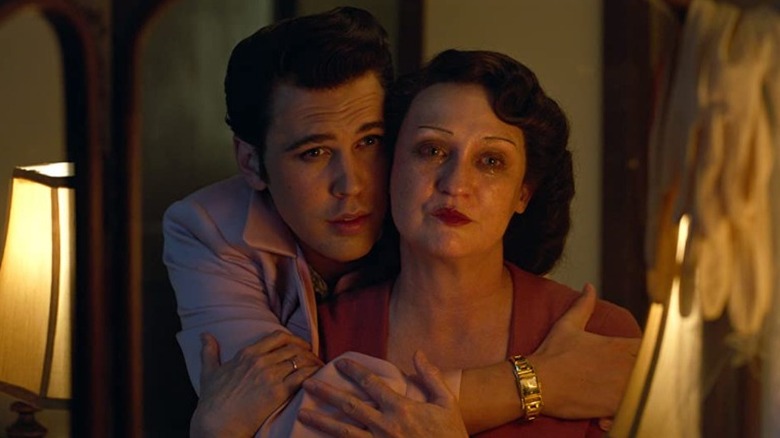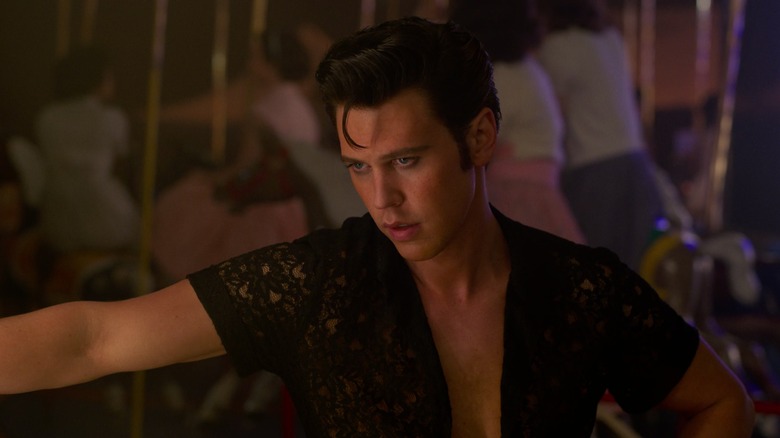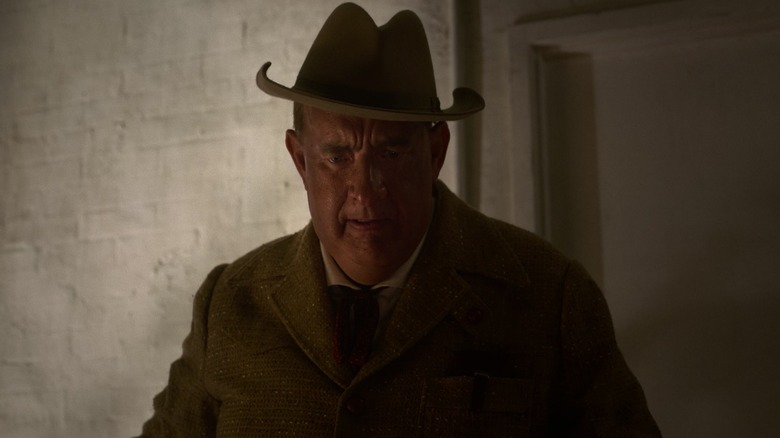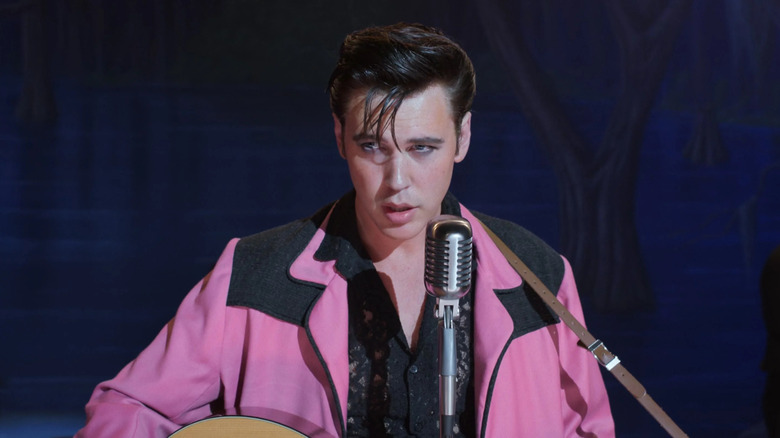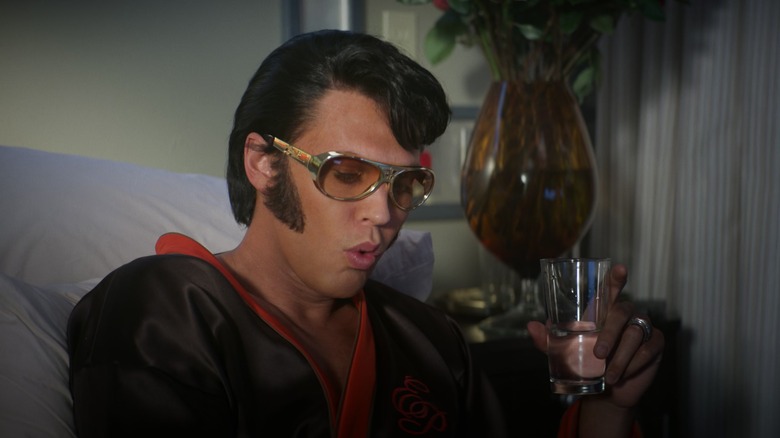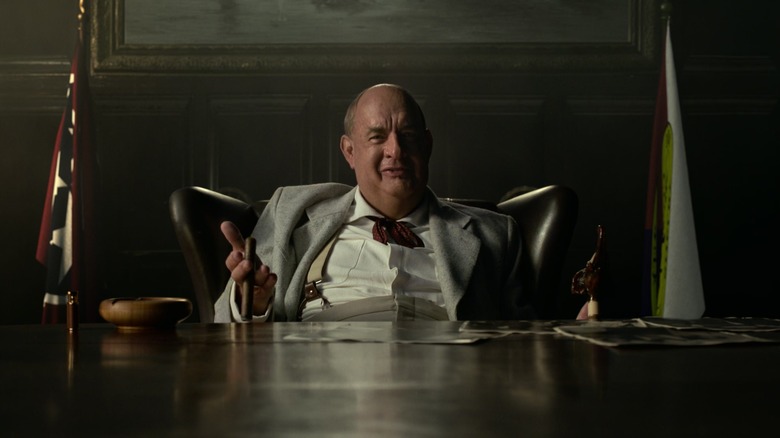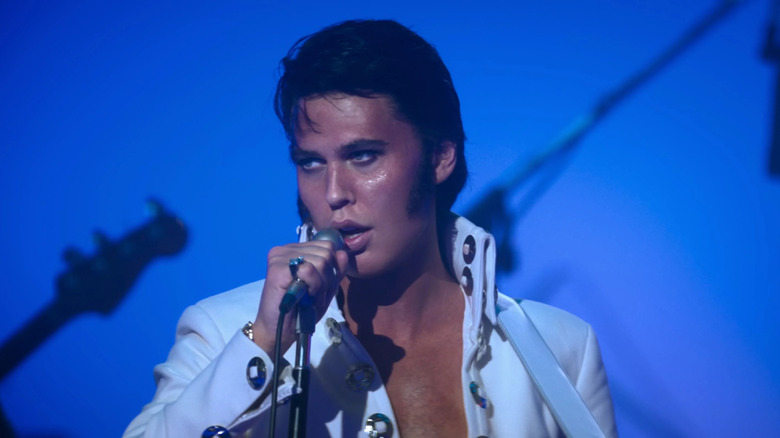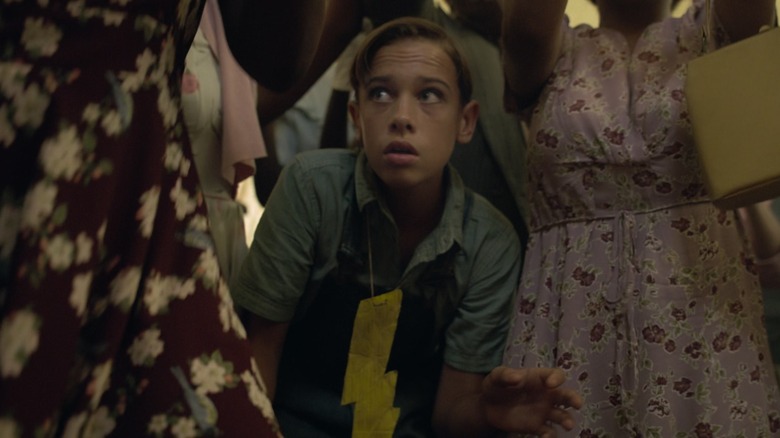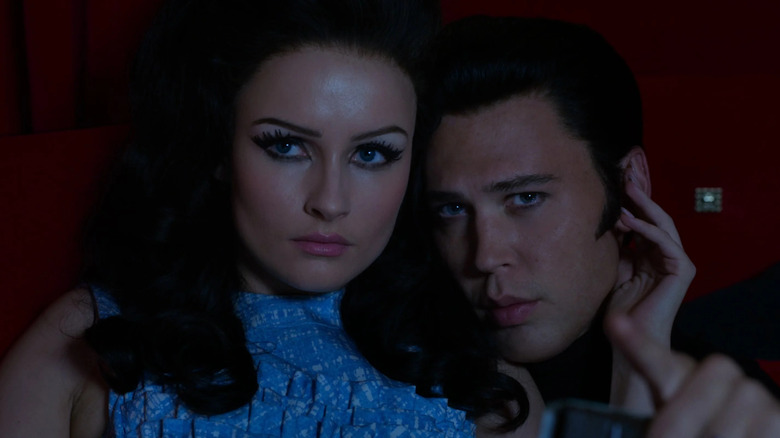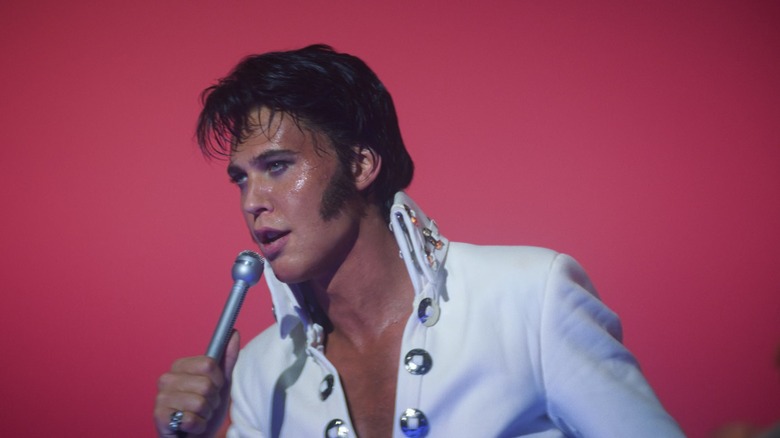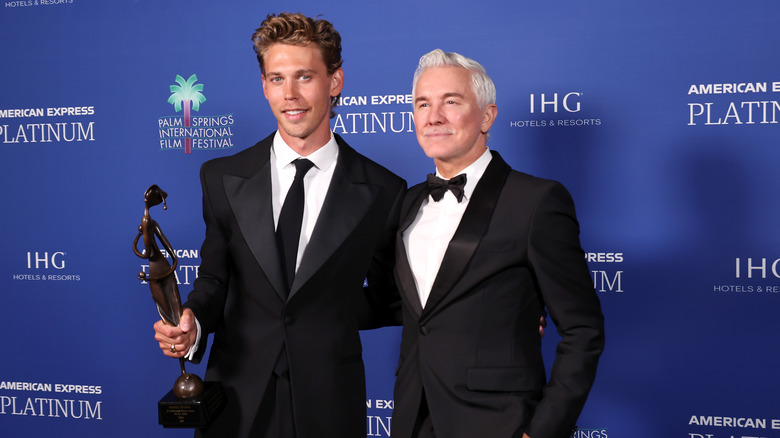Elvis: 14 Facts About Baz Luhrmann's Biopic That Will Have You Shaking Your Hips
It is undoubtedly a Herculean task to pare down Elvis Presley's life into 155 minutes, but "The Great Gatsby" director Baz Luhrmann manages just that with "Elvis." The 2022 biopic follows Elvis from birth to death, although the narrative is told through the eyes of his corrupt and egotistical manager, Colonel Tom Parker (Tom Hanks). In this non-linear film, Chaydon Jay portrays Elvis during his younger years, with Austin Butler taking over as the King of Rock and Roll from young adulthood until his death at age 42. The film's main cast is rounded out by Olivia DeJonge, who plays Pricilla, and Helen Thompson and Richard Roxburgh, who play Elvis' parents Gladys and Vernon.
"Elvis" was a labor of love for everyone involved, but Luhrmann wasn't totally sold on the project when Gail Berman, who manages the musician's estate, approached him about the biopic. He told Deadline that she only saw him at the helm of the movie and never stopped pursuing the idea. Of course, it didn't take that much for the director to get on board, and, once he was, he was brimming with ideas. His star, Butler, praised Luhrmann for his collaborative style during the film's two-year production period. "Baz has this extraordinary quality where he doesn't have a barrier between life and art ... that's an amazing quality to be around," the actor gushed.
The biopic premiered at the Cannes film festival on June 22 and received a 12-minute standing ovation. However, it was a long road getting there. Not only did a global pandemic slow production, but a lot of work had to be put in behind the scenes to make the film work as well. Keep reading to discover fascinating facts you didn't know about "Elvis."
Austin Butler felt that playing Elvis was meant to be
"Once Upon a Time in Hollywood" star Austin Butler hadn't given much thought to playing one of the world's most iconic figures in music before 2018, but an Elvis Christmas song sparked something in him. "I had never heard it before in my life, but in the month prior to hearing about Baz making the film, an Elvis Christmas song was on the radio, and I was kind of just goofing around, singing along to it. And my friend said, 'You've got to play Elvis,'" Butler told Deadline.
His friend — who was actually his then-girlfriend Vanessa Hudgens — added that the natural blonde has just dyed his hair dark, which she found all the more convincing. She even suggested he try to get the rights to write an Elvis biopic. "It is your calling," she recalled telling him, per ET.
Butler said Hudgens brought up the idea again a few weeks later when he was playing the piano. He dismissed it again, but a week later his agent told him about Baz Luhrmann's movie. "Well, immediately I got chills," Butler recalled to Deadline. "Because of the synchronicity of it all, I thought, 'I got to just give it everything I got.'" It was clearly meant to be.
How Austin Butler's real-life parallel to Elvis came out in his audition
Austin Butler has shared plenty of details about his long audition process for "Elvis," which mostly consisted of him reading the script and singing for Baz Luhrmann over and over again. "It was unlike any audition," he admitted on "The Kelly Clarkson Show." Before that grueling process began, though, Butler had to send the director a self-tape, which he said was a video of him playing the piano and singing "Unchained Melody."
The video was raw and emotional, and Luhrmann admitted to Variety that he was blown away by Butler's performance. He'd just previously discovered that Elvis was 23 when his mom tragically died, the same age that Butler was when he lost his mom, too. This, of course, influenced his performance. "I ended up filming this tape that came out of a nightmare that my mom was dying again. It was an emotion of such deep pain. It kind of stripped away the icon of him, or the caricature of him, and it just made him so human," Butler told Deadline. The humanization of Elvis is exactly what Luhrmann was looking for though, and after testing Butler's ability to keep up with him on set, Luhrmann knew he'd found his Elvis.
Harry Styles wanted to play the King of Rock and Roll
Austin Butler faced some fierce competition for the role of Elvis. Before he was officially in the running, Baz Luhrmann had been screen-testing many other actors and singers — one being the "As It Was" singer Harry Styles. In fact, Styles was one of the frontrunners for the role before Butler entered the ring.
Styles was desperate to get the role, citing Elvis as one of his biggest influences growing up. During a radio interview, he explained: "Elvis was probably the first person I knew besides my family when I was a kid ... For that reason, there was something incredibly sacred surrounding him, so I thought I should try to get the part" (via NME). Unfortunately, Luhrmann, who could do nothing but sing Styles' praises to People, thought there was one problem with casting the former One Direction singer: "...the real issue with Harry is, he's Harry Styles. He's already an icon," he explained.
"Elvis" casting agent Denise Chamain told Variety that there were other names in the mix, too. The first was Miles Teller, who showed off his musical chops by singing the rock and roll hit "Great Balls of Fire" in "Top Gun: Maverick" (fun fact: the song was originally performed by Jerry Lee Lewis, another Sun Records alum). Additionally, "West Side Story" star Ansel Elgort was on Luhrmann's radar for the part. Ultimately, though, Butler beat them all out because he was the best person for the job.
Austin Butler ate, slept, and breathed Elvis for two years
Austin Butler told Deadline that from the moment he heard about "Elvis," he started prepping for his five-month-long audition process as though he'd already gotten the role. Acting like he was already making the movie was clearly a tactic that worked for the actor. It also helped that Denzel Washington put in a good word for him with director Baz Luhrmann. "I've just worked with this guy on stage. I've never seen a work ethic like it," Luhrmann recalled Washington telling him after working with Butler on "Once Upon a Time in Hollywood."
Butler lived up to Washington's praise, doing nothing else but living as Elvis for the two years it took to film the biopic. "I basically put the rest of my life on pause for two years and I just absorbed everything that I possibly could and I just went down the rabbit hole of obsession," he admitted when asked what it took to bring Elvis to life in a Cannes press conference. The process came with a learning curve, though, as Butler explained that in the beginning he was focused on making himself look as much like The King as possible before he realized that the most important thing was finding a way to make sure that Elvis' true personality, soul, and humanity shone through in his performance. He balanced the precision of studying Elvis' movements on stage until he knew everything inside out, making the performances look authentic and spontaneous.
COVID-19 temporarily shut down production
"Elvis" began pre-production in 2019, and, after casting the film's stars, preparations were being made to begin filming in Australia in March 2020. However, this came to a grinding halt when star Tom Hanks and his wife Rita Wilson tested positive for COVID-19. Thankfully, the couple's symptoms weren't too severe, and they were able to return to the United States two weeks later.
Like most people, Luhrmann didn't anticipate the longevity of the pandemic, and while Hanks and Wilson were in quarantine and cast and crew members who'd been in contact with them were isolating, he tweeted that the team would be back to work soon enough. "We're not even taking our sets down, simply locking up the creative space over the next few days."
While no other members of the cast or crew became infected with the novel coronavirus, it still ended up being months before they were able to return to set in Queensland's Gold Coast. Filming officially began on September 23, two weeks after Hanks returned to Australia. "We're back to, as Elvis liked to say, 'taking care of business!'" Luhrmann said in a statement to Variety at the time. He added: "It is a real privilege in this unprecedented global moment that Tom Hanks has been able to return to Australia to join Austin Butler and all of our extraordinary cast and crew to commence production on Elvis." Butler later confirmed to GQ that filming finished in March 2021.
Austin Butler actually sang in the film
Despite telling director Baz Luhrmann that he didn't really sing during one of his auditions — something that was clearly not the case since his self-tape singing "Unchained Melody" helped get him the role — Butler ended up performing some of the King's iconic songs in "Elvis." According to Deadline, Luhrmann planned to have a voice impersonator take over vocals for Elvis' younger years because he wasn't able to use the original recordings for copyright reasons. However, he was completely moved by Butler's abilities. "It's spine-tingling. We just started riffing, and hours would go by," he said. Butler clearly played down his own musical experience, which includes playing the guitar and the violin and singing on shows like "Are You There, Chelsea?"
"The Shannara Chronicles" star continued to sing the vocals for his character, but as the movie progressed Luhrmann chose to blend Butler's voice with the King's original music to show how his voice changed over the years. He still sang every song, but after 1968 "we ended up slicing [parts of] Austin's performance. We used a lot of the breaths, grunts, and body movements that are Austin, and we'd switch back to Elvis," composer Elliot Wheeler told Collider.
To create an authentic sound for the film, Luhrmann also cast real musicians rather than just actors, per Deadline. He welcomed four-time Grammy winner Gary Clark Jr. as blues singer-songwriter Arthur "Big Boy" Crudup. Four-time Grammy nominee Yola also joined the cast as Sister Rosetta Tharpe.
Elvis was never going to be a light-hearted biopic
Although "Elvis" is a biopic, it doesn't just neatly retell the events of the King's life and career, and despite its upbeat musical numbers, it certainly couldn't be called a light-hearted feature. The film, which is a drama, makes it clear from the off that Elvis Presley didn't have it easy growing up. As Baz Luhrmann noted to Deadline, Elvis had a big hole in his heart that came from his childhood. Losing his twin brother at birth, the shame of his father going to jail, and being dirt poor for a long period. These were all things that the director wanted to use in the film to show that as he grew up, he was "trying to mend his life constantly, trying to be liked and getting people to like each other." But that could only end in self-destruction, and Luhrmann wanted to shine a light on what got him to that point.
The film took a lot of research and he dug deep into Elvis as a person, even if it was uncomfortable. "There were things that were going to be difficult for them [the family] to see about Elvis, but they were also going to see the humanity and true spirituality of him, which was the most important thing," Luhrmann explained.
Baz Luhrmann also wanted the movie to be a political commentary
Along with portraying "the real Elvis," Baz Luhrmann wanted the movie to be a political commentary. This is often the case for his features, like "The Great Gatsby," which is a commentary on wealth and social inequality. Speaking on the 2022 biopic to GQ, he explained: "It isn't 'Elvis did this, Elvis did that'. It's actually about America in the '50s, '60s, and '70s. He's at the center of culture, for the good, the bad, and the ugly. And you can't talk about America in that period without talking about race, and so many other things." The film contextualizes Elvis' role in so many historical moments — like his reaction to Martin Luther King Jr.'s death and the protest song "If I Can Dream," a tribute to King, which he sang during his 1968 Comeback Special in reaction to Robert F. Kennedy's assassination.
Additionally, Tom Hanks' character, Colonel Tom Parker, was an obvious commentary on greed and corruption. "The Colonel represents the great sell in America, and this, therefore, made it about America: the sale of the soul, the artist, and the ringmaster," Luhrmann noted to Deadline. For Tom Hanks, who played the disgraced Snowman, the most interesting part of the character was how he "saw an opportunity to manifest a once-in-a-lifetime talent into a cultural force," per People. As he pointed out on and off the screen, there is no Elvis without Colonel Parker and no Colonel Parker without Elvis. "A symbiotic relationship," he added.
Austin Butler's physical transformation was lengthy
Becoming Elvis Presley is no easy task, and along with studying the King's music and speech patterns, Austin Butler also had to put in the work to physically transform into the rock and roll legend. To prepare for filming, Butler worked with a strength trainer who not only helped him get in shape but who was instrumental in helping him learn how to move his body properly for the role. A 9 News interview with Butler's trainer, former Olympic swimmer Ryan Gambin, showed clips of the actor's intense workout, which had a particular focus on hip mobility so that he could reenact Elvis' iconic dance moves.
This training went on for months, but once it came time for filming, Butler had to spend his days in costume. This meant getting his makeup and his hair — which was Elvis' calling card — exactly right, but this transformation alone took approximately four and a half hours to complete. "Elvis" hair and makeup designer Shane Thomas told Popsugar that along with his own dyed hair, Butler went through six wigs while filming the feature. In addition, he needed different prosthetics to play the music legend at different ages. "We did fewer prosthetics on his face for when he was younger to just keep him fresher and a bit more round-faced ... [and] we added jaw prosthetics when he got older to harden his jawline a little bit and make it more pronounced," he explained. Butler also had to wear prosthetics to portray Elvis toward the end of his life, similar to the ones Tom Hanks was wearing throughout the feature, which also took several hours.
Baz Luhrmann learned a lot about Elvis through his childhood best friend Sam Bell
Although not everything about "Elvis" is factually accurate (such as the creation of Elvis Presley Enterprises), certain scenes in Baz Luhrmann's biopic are spot on. Speaking during a conference at the Cannes Film Festival, Luhrmann explained that he and his team did a lot of research so the film could dig deeper than surface level. One of the people who informed the depiction of Elvis' early life was his childhood friend Sam Bell, who he tracked down in Tupelo, Memphis, Elvis' hometown, per Deadline. After reaching out a couple of times and hearing nothing back, Luhrmann and the research team drove to his address, which he said looked uninhabited. However, one spurred him on to try round the back where he found Sam's wife, who informed the director that her husband would be back from the hospital the following week.
After that, Luhrmann met with Sam, who told him more stories about Elvis that he could fit into the film. "Sam told me a whole lot, actually ... The revelations were so authentic. And he never asked for money. He just told the stories," the director explained. One scene in particular which came from Bell is the one where Elvis and his friends are watching a gospel service and he sneaks in because he's so captured by the music. Sam is the friend that tried to pull him back, before the preacher says, "Leave him be, he's with the spirit." Sadly, Bell passed away in 2021 before the film was released.
Priscilla Presley had her doubts about Austin Butler, but Baz Luhrmann knew he was perfect for the part
Baz Luhrmann spent five months auditioning and screen-testing Austin Butler, so he knew he was the perfect choice to play Elvis. However, Elvis' ex-wife Priscilla Presley has not been privy to that, and she took a bit more convincing about Butler's ability and the film in general. "She got a little bit vocal about her doubts. She said, 'I don't know, this film could be crazy. Baz can be wackadoo. And how can this skinny kid play Elvis?'" Luhrmann admitted to Deadline.
However, after watching the film at the Cannes Film Festival with her daughter Lisa Marie and granddaughter Riley Keough, she was completely moved. She praised the performance in a private letter to Luhrmann, some of which he shared. He recalled her writing: "My whole life I've had to put up with people impersonating my husband, and I don't know how that boy did it, but every move, every wink... If my husband was here, he'd say, 'Hot damn, you are me.'"
Baz Luhrmann discussed the real love story in Elvis
In "Elvis," Baz Luhrmann weaves a tangled web of relationships, from the complex dynamic between Elvis and his parents to the opportunistic relationship between the Snowman and the musician to Elvis and Priscilla's epic romance. However, there's one other relationship that the film explores that Luhrmann calls Elvis's true love story — even if he didn't fully comprehend it until after he'd made the movie.
In December 2022, the director admitted to Deadline, "I've just realized, the true love story of Elvis, and the way it fits into the oeuvre, is between the audience and Elvis ... [But] the more you get, the less love you actually feel. It's a destructive love."
The depth of this addictive love is wholly apparent to viewers of the film, though, and to Tom Hanks' character, who narrates the film. In one scene, Colonel Tom even points out how Elvis' love for Priscilla is nothing compared to the love he feels from the audience. Thus, the movie ends with Colonel Tom commenting that that's ultimately what killed him.
Elvis was a box office smash and critical triumph
"Elvis" elicited many different reactions from many different people, but most agree that the film was a triumph. As Collider noted, it is the second most successful music biopic of all time after "Bohemian Rhapsody," grossing a whopping $287.3 million globally. The reviews all sang to the same tune, too. Chicago's Daily Herald noted that "the story of the King has been told many times, but nothing like Baz Luhrmann's sensational, impressionistic take on Elvis Presley (played with pitch-perfect resonance by an explosively charismatic Austin Butler)."
As of this writing, "Elvis" holds firm at 77% on the Rotten Tomatoes Tomatometer, and has an even higher audience score of 94%. Since its release, the film has raked in 148 award nominations, including three Golden Globes and a Grammy. Austin Butler took home one of those Golden Globes, winning best actor in a motion picture drama, and he has since been nominated for an Academy Award for best actor (and is the frontrunner in that category).
Butler's speech at the Golden Globes has since gone viral. In it he shared his appreciation for Pricilla and Lisa Marie Presley, thanking them for opening their lives to him, before thanking his mom for watching over him, and paying tribute to the King himself: "You are an icon and a rebel and I love you so much. You are remembered and I will never forget," he added. That speech is made all the more bittersweet by the fact that Lisa Marie Presley unexpectedly died just two days after the event.
Playing Elvis has changed Austin Butler's life for the better
Austin Butler dedicated years of his life to learning everything he could about the King of Rock and Roll before and during the time he spent portraying him on screen. That period of time was intense, both mentally and physically, so it's not surprising that it changed him. The actor told Deadline that it's helped him grow and adjust his priorities in life going forward. "It's allowed me to really appreciate the things that I'm now getting to experience in my life, even just being with my family or anything like that. Because there's a lot of loneliness in Elvis' life," he said.
Along with his personal life, playing the King has had an impact on his career. In their review of "Elvis," the New York Post predicted that "being so good as Elvis will either explode his career, or shove it into a mouse hole." Butler has proven, though, that it's going to be the former since his star is on the rise more than ever now. He has two features coming out in 2023 including "Dune: Part 2." Speaking to GQ, director Baz Luhrmann compared Butler's continuing success to Leonardo DiCaprio's after "Romeo and Juliet." So, while Elvis may have left the building, Butler is here to stay (and, apparently, so is his Elvis accent).
